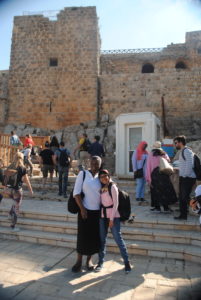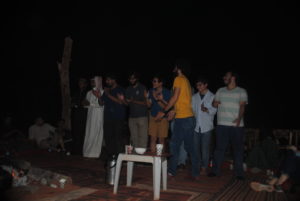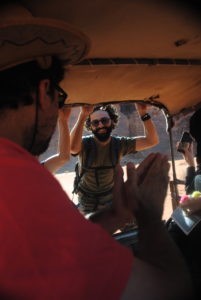Although there are many challenges for a student living in Jordan, I have been consistently impressed with the Qasid Institute’s approach to language instruction.
My typical day at Qasid is divided in two.
In the morning, I have to wake up bright and early to go to my skill class, which typically focuses on speaking, listening and writing in Arabic. My instructor, Huda al-Bayoumi, is an extremely kind woman who is very understanding of the struggles that students go through here in Jordan. In times when I have been sick or unwell and missed a class, I have found that she is very understanding and always ready to help me catch up.
Still, just because she is kind does not by any means mean that the class is easy. Our teacher encourages us to talk about the places we come from and even have debates in Arabic. Though it is quite challenging, in this class I have had the opportunity to give presentations on my country, and talk about my beliefs, values and religion. By making things interesting, the skills class has made it possible for me to learn in a supportive environment and I think I have improved my language and expanded my vocabulary vastly over the last few weeks.
After a long lunch break, which I typically spend by going back to my home in order to have lunch and then either do some homework or take a badly-needed nap, I return to Qasid where I have my ‘sciences’, which focuses on Arabic syntax and morphology. By far the more difficult of my classes, the science class is taught by Faraz Malik and is quite intense. It focuses on the complex ways in which Arabic words can have different meanings depending on their conjugation and paradigms. There are tests in almost every single day and an enormous amount of homework, but the course does a very good job of hammering home the fundamental lessons of Arabic.
It is this class in particular that causes me to often spend the better part of my evenings at my desk, memorizing rules of syntax and morphological patterns of the words. Classical Arabic is well-known as one of the most complex languages in the world, and mastering its nuances in the space of eleven weeks is not easy, but I do enjoy the challenge and take particular satisfaction in acing Malik’s tests after staying up late the night before.
The student body at Qasid is quite diverse. You have many students who are like me, PhD students from America, who need to learn Arabic. These students, who come from places like Harvard and Georgetown, tend to be a bit competitive, but are nevertheless determined to get the most out of their stay at Qasid as they can in order to advance their careers.
But there are also students who have come here for non-Academic purposes. These students, hailing from places like the Zeytouna Institute in California, have made the trip to Jordan in order to learn Arabic for no other reason than to enhance their personal understanding of the Qu’ran. For them, it is not their careers that cause them to be here, but rather their desire to achieve a higher level of religious piety. Sure enough, however, these religiously-motivated learners can be just as competitive as their academic brethren.
Still, this competitive atmosphere tends to push everyone to work harder and make the most of our time here in Jordan. The two groups mingle together in Qasid in a friendly way. Everyone wants to be at the top of the class, but we still support each other and keep our spirits up even as the demands of Qasid and the pressure of living in Jordan weigh down.
There are often weekly excursions out into the desert, including hiking trips to live with a Bedouin tribe for a night, eat their food and hike through the desert. It is these excursions out away from the insanity of Amman that I like to focus on, for here one gains insight into what Arab culture was like in days before colonization and westernization took hold.
Thus, in spite of all the challenges that I have faced in Jordan, I do think that my learning experience here has been very positive and would like to thank Qasid for being of such great help to me with my Arabic.


